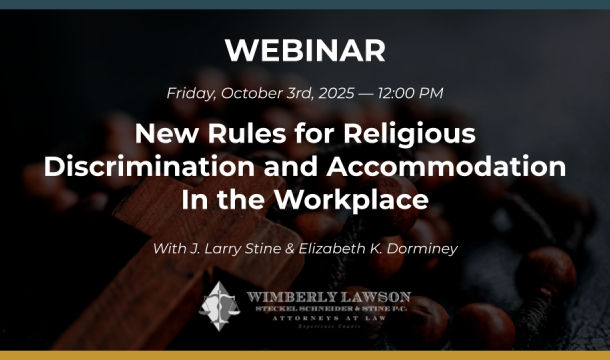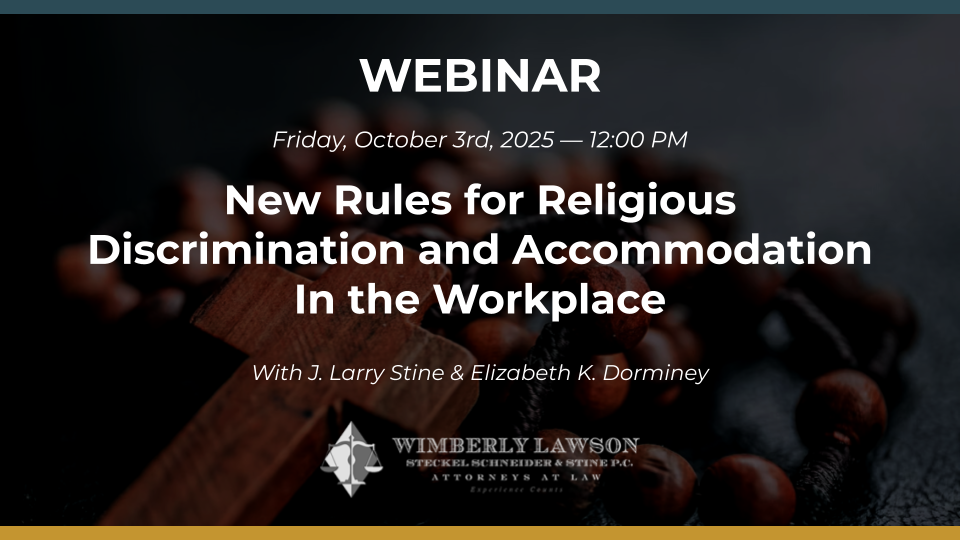EEOC AND JUSTICE DEPARTMENT ON OPPOSITE SIDES OF CLASS ACTION WAIVER AND SEXUAL ORIENTATION ISSUES
A somewhat interesting situation has resulted from the change in administrations, with the National Labor Relations Board (NLRB) and the Department of Justice (DOJ) taking opposite positions in a couple of important pending court cases. In October, two arguments will be heard in a U.S. Supreme Court case that is actually a consolidation of several cases on the issue of whether workplace arbitration agreements that ban class actions violate the National Labor Relations Act because they restrict the employees’ right to engage in "concerted activities." When the NLRB case was originally filed, the government supported the NLRB position that class and collective bans violated federal labor law. The change in administrations resulted in a new position, however, with the acting Solicitor General telling the justices that his office had reconsidered the issue with the arrival of the new Administration. "We do not believe that the Board in its prior unfair-labor-practice proceedings, or the government’s certiori petition in Murphy Oil, gave adequate weight to the Congressional policy favoring enforcement of arbitration agreements as reflected in the FAA," the new position stated. On the other hand, NLRB General Counsel Richard Griffin, whose term expires in November, a former union official, will argue the case shortly before the Board itself changes from a Democratic to a Republican majority. One Republican nominee has been confirmed by the Senate, and the other is expected to be confirmed soon.
A similar situation has arisen in an employment discrimination case involving sexual orientation. In late July, the DOJ took the position that gay, lesbian and bi-sexual workers are not covered by Title VII of the 1964 Civil Rights Act. The DOJ stated its interpretation in an amicus brief submitted to the U.S. Court of Appeals for the Second Circuit.
Since 2015, the Equal Employment Opportunity Commission (EEOC) in contrast, has interpreted Title VII’s prohibition against sex discrimination as encompassing sexual orientation bias. As of the beginning of the year, more than 3,000 sexual orientation charges were pending before the EEOC. The EEOC also is investigating some 300 cases that include transgender discrimination claims.
According to EEOC Acting Chair Victoria Lipnic, the EEOC will maintain its current position and see eventually what the Supreme Court has to say about it. Lipnic does note that Congress has not acted to expressly include such sexual orientation protections in Title VII, and various bills that would have made that interpretation have not passed Congress. Further, Lipnic acknowledges that there is no doubt that Congress was not contemplating such sex orientation discrimination when it passed the Civil Rights Law in 1964.
The federal appeals courts are currently split on the issue. Lipnic notes interesting questions such as: "What does it mean if a term has changed over time culturally? What does it mean for courts having to follow precedent?"
Editor’s Note: Not only is it interesting that the federal agencies are taking opposite positions, but the cases involve issues extremely critical to the employment community. Employers have increasingly favored requiring employees to arbitrate their legal claims rather than taking them to court, and the potential for banning class actions in arbitration agreements has made the decision more attractive to employers. Transgender and sexual orientation issues seem to have ballooned both from a litigation standpoint as well as a public interest standpoint. It should be noted that on the sexual orientation issue, even if the courts do not accept the EEOC’s position that sex orientation issues is a form of sex discrimination, existing law generally forbids discrimination based on sex stereotyping. Some transgender employees are protected under the concept of sex stereotyping based on the particular facts of their cases, even if the type of discrimination is not generally prohibited.
Related Content
Get Email Updates
Recent Content

Trump Nominates Appointments to NLRB and EEOC but Policy Changes Likely to Be Delayed

DOL Launches Self-Audit Programs Designed to Help Employers Improve Compliance

DOL Must Release EEO-1 Reports to the Public under Open Records Laws

Current Advice on Active-Shooter Situations

New Policy for Federal Workers and Religious Expressions

